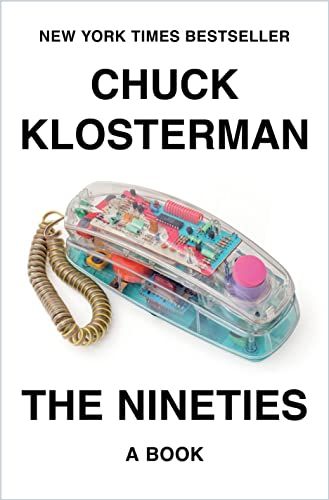Raucous cultural correspondent Chuck Klosterman focuses his gimlet eye and genius for non-linear conclusions on an ambivalent, culturally rich decade.

A Decade of Ambivalence and Irony
According to bestselling author Chuck Klosterman – author of Sex, Drugs and Cocoa Puffs and Eating the Dinosaur – the dominant spirit of the 1990s was apathy amid a swamp of events, personalities and attitudes in politics, pop culture and technology. He identifies links through the decade connecting Nirvana, the internet, baseball, Bill Clinton and Y2K. Klosterman does not offer a linear history or coherent chronology. His essays portray an era when the prevailing attitude was a self-conscious merging of ambivalence and irony.
Ironic Apathy
In the 1990s, the United States experienced its longest period of economic expansion. Unemployment hit a peak in 1992, then declined for the rest of the decade.
It was the end of the 20th century, but also the end to an age when we controlled technology more than technology controlled us.Chuck Klosterman
The most pervasive response to daily living, particularly among the young people of Gen X, born between 1966 and 1981 – was a studied, often ironic apathy. Their predominant career posture was indifference to success or popular approval. In their eyes, the most egregious offense was “selling out” — compromising your values to win riches or fame.
Nevermind
Klosterman’s most impassioned reportage centers around Nirvana’s 1991 album Nevermind, which extolled a new attitude and sensibility – bringing punk rock values to the mainstream and offering a template for 1990s aesthetics. Nirvana’s hit “Smells Like Teen Spirit” included the lyrics, “Oh well, whatever, never mind,” – a rallying cry for Generation X’s self-conscious apathy.
Nirvana became massively popular. Front man Kurt Cobain became famous for his contempt of mass popularity. Cobain grasped that rock had become a corporate-sponsored illusion, and he was mortified that his band participated in it. From the top of the charts, Cobain spoke for the alienated rock underground. Klosterman regards this as the quintessential ’90s paradox.
Internet
Before the 1990s, few people knew much about the internet. Klosterman identifies 1995 as a pivot point when the introduction of the Netscape Navigator browser gave everyone an efficient portal to the internet via the World Wide Web. Amazon began selling books, and Craigslist debuted digital classified ads that would decimate the newspaper business.
Many embraced the internet as a harbinger of a future of absolute freedom. Proselytizers expected it to give everyone an equal voice and thus nourish true democracy. This vision of the internet’s future depended on preventing governments from restricting how their citizens could use the web.
[The internet] is literally a context of no context, thus negating the very notion of contextual meaning.Chuck Klosterman
World Wide Web indexes and search engines – Google, most significantly – opened internet use to the general public. Google used algorithms to rank search results by relevance. For most people, the top-ranked result became the settled answer to any question.
Online users select what they want to see and when to watch it from an endless stream of unconnected artifacts. The internet itself provides the only context.
Being smart no longer required remembering anything, as people outsourced memory to machines. Klosterman makes the telling point that the 1990s were the last decade in which people lived without instant access to verifiable facts.
Bill Clinton
Clinton’s political instincts aligned with the times. In the 1990s, adults were comfortable with their main role in society – being consumers. Clinton became a salesman, not of consumer goods, but of the “signifiers of empathy.”
Clinton puzzles many people who came of age after his presidency. In particular, the resolution of the Monica Lewinsky scandal troubles people of the #MeToo era. Clinton had an affair with Lewinsky, 22, a White House intern. He lied about it under oath and survived an impeachment.
In Clinton’s televised speech following the Oklahoma City bombing in 1995, he delivered his lines as spontaneous expressions of his feelings, though he was clearly reading them. By applying his awareness of how television worked — synchronized with his audience’s sophisticated understanding of the medium — Clinton moved viewers to waive their skepticism and accept his sincerity.
Steroids
Baseball traditionally held a special place in American culture. In the 1980s, films such as Field of Dreams still portrayed the sport as a spiritual experience.
As the decade progressed, baseball’s past became more attractive than its future. Ken Burns’ 1994 PBS documentary, Baseball, drew a massive audience and portrayed the game as crucial to understanding America.
The year 1998 saw a sudden improvement in batting prowess, with a record-smashing home-run race between Mark McGwire and Sammy Sosa. However, when proof emerged that Sosa and McGwire had used performance-enhancing drugs, fans felt a new sense of betrayal and embarrassment. Interest in baseball slackened.
Y2K
Computer scientists described a possible Y2K – year 2000 – disaster scenario. They speculated that when 2000 began humanity might lose computer control of power grids, banking systems, air traffic and nuclear weapons.
The Y2K risk scenario centered on how programmers wrote code throughout the 20th century. Early computer microchips had only narrow capacity, so programmers saved space by using only the last two digits of a year. People worried that software would read the year 2000 as “00,” which the computer would interpret as referring to 1900. Theorists proposed that this mistranslation might cause computers worldwide to fail simultaneously.
But nothing happened.
The 1990s seem like a period when the world was starting to go crazy, but not so crazy that it was unmanageable or irreparable.Chuck Klosterman
The lack of major cataclysm felt like a letdown. And 2000 proved to be just another year, another continuation of the past, except that it brought the nineties to an end.
Insights and Attitude
Klosterman’s unrelenting attitude is his gift as a cultural correspondent. His unrelenting attitude is also what makes reading too many of his pages in a row somewhat tiresome. Klosterman rants, sometimes insightfully, sometimes apparently to hear his own voice. The secret to appreciating his often entertaining and singular insights is to read only a few of them at a time. Two chapters in a row seem like a proper dose. And you can read Klosterman’s chapters in any order you like. There is no through-line or narrative build. That said, his genius-level insights will leave you laughing aloud.




